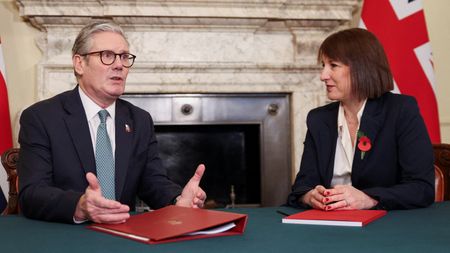By Kate Holton and Alistair Smout
LONDON (Reuters) -British finance minister Rachel Reeves has scrapped plans to raise income tax rates in this month’s budget, the Financial Times said, seeking to avoid a political backlash but alarming investors who pushed up government borrowing costs.
Reeves is expected to need to raise tens of billions of pounds to stay on track for her fiscal targets, and her recent comment that “we will all have to contribute” was seen as paving the way for the government to break its main election pledge and hike income tax rates.
Sterling dipped 0.3% and touched its lowest against the euro in more than two-and-a-half years after the report was published, with markets on edge over any suggestion that Reeves will fail to do what is needed to get the public finances back on a solid footing.
British government bond prices fell heavily as the market opened on Friday, with yields rising by about 12 basis points across long-dated gilts, putting them on track for their worst day since July 2, when a tearful appearance by Reeves in parliament spooked investors.
A Treasury spokesperson declined to comment on the FT report, which was also carried later by some other UK media.
MARKETS HAD TAKEN REASSURANCE FROM TALK OF TAX RISES
In recent weeks investors had taken reassurance from signals from Reeves that she was prepared to take tough measures to remain on course to meet her fiscal targets of balancing the government budget by 2029/2030, excluding investment spending, contributing to a drop in government bond yields. Bond yields move inversely to prices.
Economist Kallum Pickering at Peel Hunt said Reeves would now likely opt for a “haphazard patchwork of smaller anti-growth tax increases”.
“That would be a bad outcome,” he said. “It would add to uncertainty, further damage the government’s already tarnished credibility, and complicate any BoE judgement to potentially offset tax rises with rate cuts.”
The FT said one revenue-raising alternative for Reeves was to cut the thresholds at which people pay different rates of income tax.
Paul Johnson, a former director of the Institute of Fiscal Studies think tank, told BBC radio that such a move could raise large amounts of money for the Treasury but would disproportionately hurt lower-paid workers.
THINK TANKS HAVE WARNED OF NEED TO RAISE MONEY
The National Institute of Economic and Social Research, a leading think tank, had warned that Reeves needed to embark on major tax rises to avoid a repeat of the loss of market confidence that cost former prime minister Liz Truss her job.
The FT said the decision to change plans, taken this week, was communicated to the Office for Budget Responsibility on Wednesday. It cited people briefed on the revised plans as saying Reeves would instead rely on a “smorgasbord” approach of hiking a range of narrowly drawn taxes.
Reeves and Prime Minister Keir Starmer said before last year’s election that they would not raise taxes for “working people” including income tax, social security contributions and value-added tax.
The pledge was designed to reassure voters that a Labour government would not resort to ideological tax-and-spend policies.
But at its first budget a year ago it raised 40 billion pounds (52.7 billion) to invest in national infrastructure and improved public services, mostly through higher levies on business. The economic outlook has deteriorated further since then.
Earlier this week, Reeves told BBC radio that she could only stick with the manifesto commitments if she made deep cuts in capital spending.
($1 = 0.7451 pounds)
(Reporting by Mrinmay Dey in Bengaluru; Additional reporting by Harshita Meenaktshi; Writing by Kate Holton; Editing by Thomas Derpinghaus, Emelia Sithole-Matarise and Sharon Singleton)










